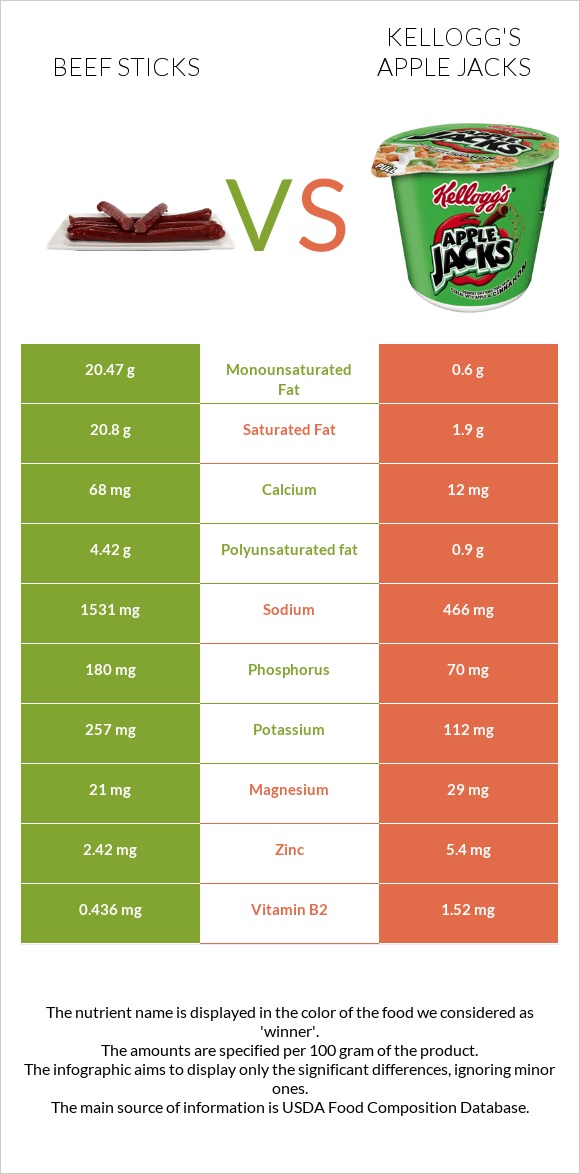Beef sticks vs. Kellogg's Apple Jacks — In-Depth Nutrition Comparison
Compare
Significant differences between beef sticks and kellogg's Apple Jacks
- The amount of vitamin B12, iron, vitamin B6, vitamin B1, folate, vitamin B3, vitamin B2, and vitamin C in kellogg's Apple Jacks is higher than in beef sticks.
- Kellogg's Apple Jacks cover your daily vitamin B12 needs 183% more than beef sticks.
- Kellogg's Apple Jacks have 11 times less saturated fat than beef sticks. Beef sticks have 20.8g of saturated fat, while kellogg's Apple Jacks have 1.9g.
Specific food types used in this comparison are Snacks, beef sticks, smoked and Cereals ready-to-eat, KELLOGG, KELLOGG'S APPLE JACKS.
Infographic

Infographic link
Mineral Comparison
Mineral comparison score is based on the number of minerals by which one or the other food is richer. The "coverage" charts below show how much of the daily needs can be covered by 300 grams of the food.
| Contains more CalciumCalcium | +466.7% |
| Contains more PotassiumPotassium | +129.5% |
| Contains more CopperCopper | +32.7% |
| Contains more PhosphorusPhosphorus | +157.1% |
| Contains more MagnesiumMagnesium | +38.1% |
| Contains more IronIron | +373.5% |
| Contains more ZincZinc | +123.1% |
| Contains less SodiumSodium | -69.6% |
| Contains more ManganeseManganese | +480.2% |
Vitamin Comparison
Vitamin comparison score is based on the number of vitamins by which one or the other food is richer. The "coverage" charts below show how much of the daily needs can be covered by 300 grams of the food.
| Contains more Vitamin CVitamin C | +694.1% |
| Contains more Vitamin AVitamin A | +3953.8% |
| Contains more Vitamin B1Vitamin B1 | +850.4% |
| Contains more Vitamin B2Vitamin B2 | +248.6% |
| Contains more Vitamin B3Vitamin B3 | +294.3% |
| Contains more Vitamin B6Vitamin B6 | +773.2% |
| Contains more Vitamin B12Vitamin B12 | +440% |
| Contains more FolateFolate | +∞% |
All nutrients comparison - raw data values
| Nutrient |  |
 |
DV% diff. |
| Vitamin B12 | 1µg | 5.4µg | 183% |
| Iron | 3.4mg | 16.1mg | 159% |
| Vitamin B6 | 0.205mg | 1.79mg | 122% |
| Vitamin B1 | 0.141mg | 1.34mg | 100% |
| Folate | 0µg | 357µg | 89% |
| Saturated fat | 20.8g | 1.9g | 86% |
| Vitamin B3 | 4.54mg | 17.9mg | 84% |
| Vitamin B2 | 0.436mg | 1.52mg | 83% |
| Fats | 49.6g | 3.4g | 71% |
| Vitamin A | 13µg | 527µg | 57% |
| Vitamin C | 6.8mg | 54mg | 52% |
| Monounsaturated fat | 20.47g | 0.6g | 50% |
| Sodium | 1531mg | 466mg | 46% |
| Cholesterol | 133mg | 0mg | 44% |
| Fiber | 9.3g | 37% | |
| Protein | 21.5g | 5.1g | 33% |
| Carbs | 5.4g | 88.2g | 28% |
| Zinc | 2.42mg | 5.4mg | 27% |
| Polyunsaturated fat | 4.42g | 0.9g | 23% |
| Vitamin D | 143 IU | 18% | |
| Vitamin D | 3.6µg | 18% | |
| Manganese | 0.086mg | 0.499mg | 18% |
| Phosphorus | 180mg | 70mg | 16% |
| Selenium | 5.6µg | 10% | |
| Calories | 550kcal | 375kcal | 9% |
| Calcium | 68mg | 12mg | 6% |
| Potassium | 257mg | 112mg | 4% |
| Copper | 0.13mg | 0.098mg | 4% |
| Magnesium | 21mg | 29mg | 2% |
| Vitamin E | 0.12mg | 1% | |
| Choline | 7.5mg | 1% | |
| Net carbs | 5.4g | 78.9g | N/A |
| Sugar | 43.7g | N/A | |
| Vitamin B5 | 0.328mg | 0.345mg | 0% |
| Vitamin K | 0.4µg | 0% | |
| Tryptophan | 0.184mg | 0.06mg | 0% |
| Threonine | 0.832mg | 0.18mg | 0% |
| Isoleucine | 0.818mg | 0.192mg | 0% |
| Leucine | 1.473mg | 0.468mg | 0% |
| Lysine | 1.518mg | 0.132mg | 0% |
| Methionine | 0.454mg | 0.084mg | 0% |
| Phenylalanine | 0.801mg | 0.252mg | 0% |
| Valine | 0.95mg | 0.264mg | 0% |
| Histidine | 0.53mg | 0.144mg | 0% |
Macronutrient Comparison
Macronutrient breakdown side-by-side comparison
Protein:
21.5 g
Fats:
49.6 g
Carbs:
5.4 g
Water:
19.1 g
Other:
4.4 g
Protein:
5.1 g
Fats:
3.4 g
Carbs:
88.2 g
Water:
2.5 g
Other:
0.8 g
| Contains more ProteinProtein | +321.6% |
| Contains more FatsFats | +1358.8% |
| Contains more WaterWater | +664% |
| Contains more OtherOther | +450% |
| Contains more CarbsCarbs | +1533.3% |
Fat Type Comparison
Fat type breakdown side-by-side comparison
Saturated fat:
Sat. Fat
20.8 g
Monounsaturated fat:
Mono. Fat
20.47 g
Polyunsaturated fat:
Poly. Fat
4.42 g
Saturated fat:
Sat. Fat
1.9 g
Monounsaturated fat:
Mono. Fat
0.6 g
Polyunsaturated fat:
Poly. Fat
0.9 g
| Contains more Mono. FatMonounsaturated fat | +3311.7% |
| Contains more Poly. FatPolyunsaturated fat | +391.1% |
| Contains less Sat. FatSaturated fat | -90.9% |





